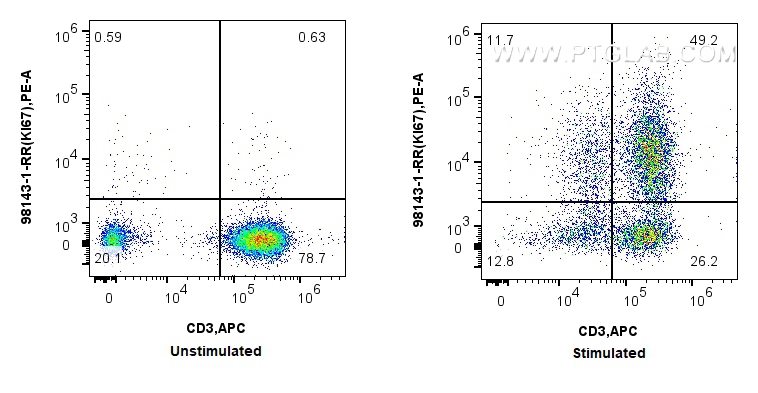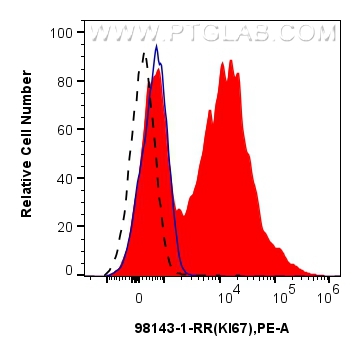Anti-Human Ki-67 Rabbit Recombinant Antibody
Ki-67 Uni-rAbTM Recombinant Antibody for FC (Intra)
Host / Isotype
Rabbit / IgG
Reactivity
human
Applications
FC (Intra)
Conjugate
Unconjugated
CloneNo.
241499E7
Cat no : 98143-1-RR
Synonyms
Validation Data Gallery
Tested Applications
| Positive FC (Intra) detected in | PHA treated human PBMCs |
Recommended dilution
| Application | Dilution |
|---|---|
| This reagent has been tested for flow cytometric analysis. It is recommended that this reagent should be titrated in each testing system to obtain optimal results. | |
| Sample-dependent, Check data in validation data gallery. | |
Product Information
98143-1-RR targets Ki-67 in FC (Intra) applications and shows reactivity with human samples.
| Tested Reactivity | human |
| Host / Isotype | Rabbit / IgG |
| Class | Recombinant |
| Type | Antibody |
| Immunogen | Peptide |
| Full Name | antigen identified by monoclonal antibody Ki-67 |
| Calculated Molecular Weight | 359 kDa |
| GenBank Accession Number | NM_002417 |
| Gene Symbol | KI67 |
| Gene ID (NCBI) | 4288 |
| Conjugate | Unconjugated |
| Form | Liquid |
| Purification Method | Protein A purfication |
| Storage Buffer | PBS with 0.09% sodium azide, pH 7.3. |
| Storage Conditions | Store at 2 - 8°C. Stable for one year after shipment. |
Background Information
The Ki-67 protein (also known as MKI67) is a cellular marker for proliferation. Ki67 is present during all active phases of the cell cycle (G1, S, G2 and M), but is absent in resting cells (G0). Cellular content of Ki-67 protein markedly increases during cell progression through S phase of the cell cycle. Therefore, the nuclear expression of Ki67 can be evaluated to assess tumor proliferation by immunohistochemistry. It has been demonstrated to be of prognostic value in breast cancer. In head and neck cancer, several studies have reported an association between high proliferative activity and poorer prognosis.
Protocols
| Product Specific Protocols | |
|---|---|
| FC protocol for Ki-67 antibody 98143-1-RR | Download protocol |
| Standard Protocols | |
|---|---|
| Click here to view our Standard Protocols |




